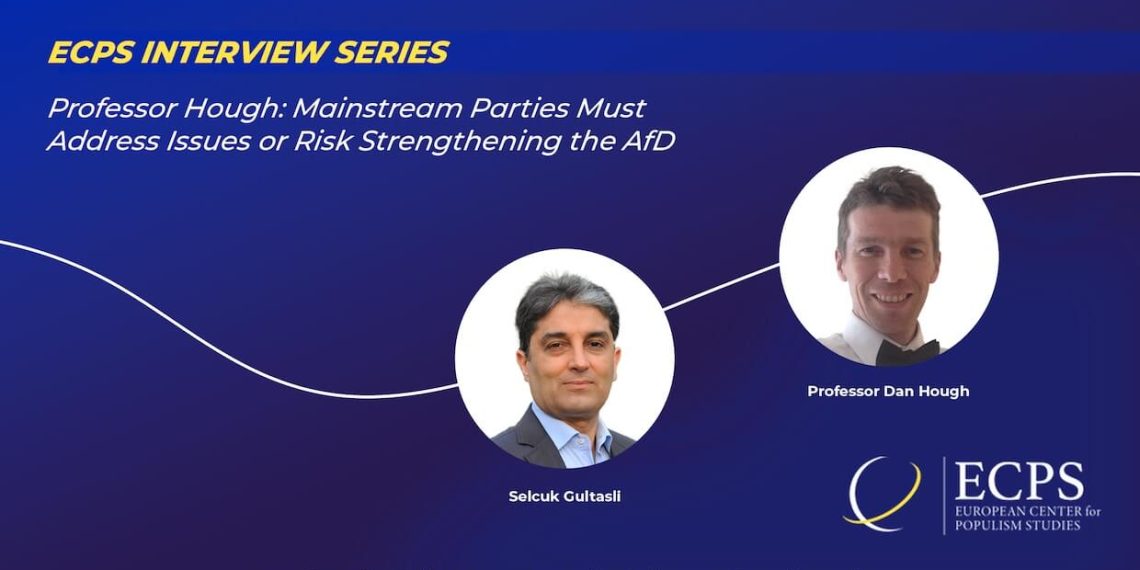In an interview with the ECPS, Professor Dan Hough warns that mainstream parties must engage with voters’ real concerns or risk further legitimizing the far-right Alternative for Germany (AfD). “Ignoring the AfD hasn’t worked, and simply adopting their rhetoric hasn’t either,” Professor Hough explains. Instead, he urges democratic parties to develop credible policies that address the economic and social anxieties fueling AfD support. He highlights how discontent—particularly in Eastern Germany—extends beyond migration, with deeper dissatisfaction driving voters toward populist alternatives. As the AfD continues to shape public debate, Professor Hough argues that mainstream parties must lead with solutions rather than reactionary responses. “The discourse must be smart, and the outcomes must be meaningful.”
Interview by Selcuk Gultasli
In an in-depth interview with the European Center for Populism Studies (ECPS), Professor Dan Hough, a leading expert on corruption and populist politics from the University of Sussex, offers critical insights into the Alternative for Germany (AfD)’s electoral gains and the broader implications for German democracy. As the AfD nearly doubled its vote share in Sunday elections compared to the 2021 elections, mainstream parties now face urgent questions about how to respond to the party’s growing appeal. Professor Hough warns that ignoring the AfD has not weakened it—nor has engagement through policy imitation. Instead, he argues that mainstream parties must confront the real grievances driving voter discontent. “The challenge is to find a language that acknowledges the problems the AfD highlights while offering solutions,” he says. “If they fail to do so, the AfD will continue to benefit, pointing to government inadequacies in dealing with these issues on its own terms.”
While the AfD has thrived on anti-elite and anti-immigration rhetoric, Professor Hough emphasizes that its rise is rooted in broader dissatisfaction with Germany’s political establishment. He points to Eastern Germany, where frustration over decades of economic disparity, social change, and political disillusionment has fueled the party’s success. “Migration is an important issue, but the deeper wells of dissatisfaction run much deeper,” Professor Hough explains. He highlights how, in many cases, AfD voters are not driven purely by far-right ideology but rather by a sense of being ignored by the political mainstream. This is why simply branding AfD supporters as anti-democratic is counterproductive—it alienates them further and pushes them deeper into the party’s ranks.
Professor Hough warns that if mainstream parties continue to avoid these tough discussions—or adopt reactionary rhetoric to compete with the far-right—they risk further legitimizing the AfD. Drawing comparisons to Austria’s Freedom Party (FPÖ), he notes how engaging with populist forces without a clear alternative vision can backfire, as seen in Austria, where the FPÖ has outperformed the AfD. “Ignoring the AfD has not worked. Engaging with them, as Austria has done with the FPÖ, has also not worked. So what do we do?” he asks. Instead of reactive politics, he argues, mainstream parties must lead the debate and provide credible policy responses that resonate with voters before the AfD defines the terms of the discourse.
As the interview unfolds, Hough delves into the role of corruption narratives in populist movements, the paradox of “anti-corruption populism,” and the risks of democratic backsliding if far-right parties continue to reshape public debate. Ultimately, he underscores that Germany’s best defense against the AfD is not exclusion, but better governance and tangible solutions to the concerns that fuel its rise.
Professor Hough stresses that mainstream parties must acknowledge the grievances the AfD exploits while providing meaningful solutions. "The discourse has to be smart, and the policy outcomes have to be meaningful. If that happens, the AfD’s rise does not have to be unstoppable." His analysis offers a crucial perspective on the evolving landscape of German and European politics.


